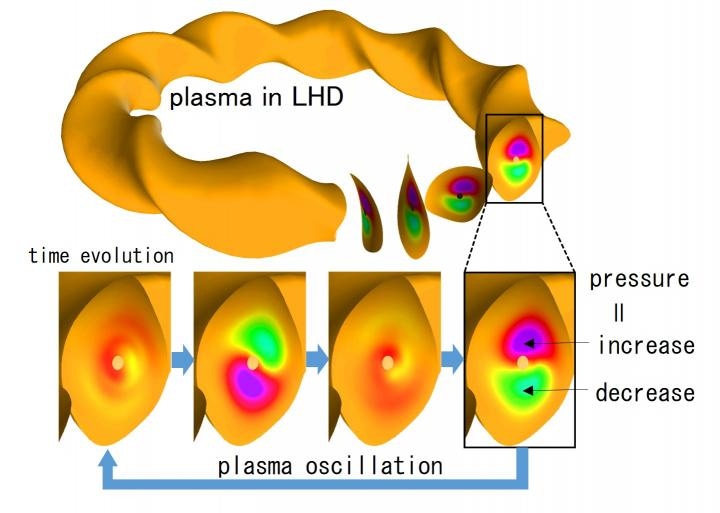Aug 7 2019
A group of fusion scientists has been successful in demonstrating that it is possible to heat ions by plasma oscillations induced by high-energy particles.
 Plasma oscillations driven by high-energy particles in a plasma in LHD. (Image credit: NIFS)
Plasma oscillations driven by high-energy particles in a plasma in LHD. (Image credit: NIFS)
The scientists have proved this by carrying out a large-scale simulation using a new hybrid-simulation program that links calculations for ions, plasma oscillations, and high-energy particles. This study will speed up research on plasma self-heating for achieving fusion energy.
In the future, the fusion reaction between deuterium and tritium ions in a high-temperature plasma will be used in fusion reactors. The high-energy alpha particles produced during the fusion reaction transfer their energy to the plasma, and this self-heating of plasma maintains the high-temperature condition needed for the fusion reaction.
However, one challenge is that the fuel ions are weakly heated since the high-energy particles offer most of their energy to electrons by means of collisions with the electrons. To enhance the rate of ion heating, it is suggested to heat the ions by the plasma oscillations induced by the high-energy particles. But this mechanism of ion heating has not been confirmed yet.
The research team including Assistant Professor Hao Wang and Professor Yasushi Todo of the National Institutes of Natural Sciences (NINS) National Institute for Fusion Science (NIFS) studied the ion heating by plasma oscillations with the help of computer simulations.
Earlier, Professor Todo created a computer program with the ability to simulate the state of the plasma as a whole, treated as fluid, and the movement of high-energy particles in a plasma at the same time.
Since the program links and calculates the particles and the fluid, it is known as the hybrid-simulation program. It allows the analyses of the interaction between the high-energy particles and the plasma oscillations. The program is highly rated among fusion scientists, currently, various simulation studies using the program are underway.
However, the study of ion heating by plasma oscillations induced by high-energy particles necessitates expansion of the hybrid-simulation program to simulate ion motions driven by the plasma oscillations. The researchers successfully develope a new hybrid-simulation program through the calculation of ions in a plasma as particles and through linking of the three types of calculations for the ions, the plasma oscillations, and the high-energy particles.
They used the new hybrid-simulation program to carry out a large-scale simulation on the supercomputer in relation to the plasma produced in the Large Helical Device (LHD). (On the LHD, the high-energy hydrogen particles within the plasma are used to analyze the plasma oscillations induced by high-energy particles.)
From the new hybrid simulation, it is evident that ions acquire energy from plasma oscillations excited by the high-energy particles. This shows that it is possible to increase the rate of ion heating in a self-heating plasma by using the plasma oscillations.
As a result, for the first time, the researchers have demonstrated the ion heating by plasma oscillations. Based on the outcomes of this research, studies on self-heating plasma for achieving fusion energy will be expedited.
The outcomes of the study were published in Nuclear Fusion in August 2019 as Wang, et al. “Simulation of energetic particle driven geodesic acoustic modes and the energy channeling in the Large Helical Device plasmas.” The study was financially supported by the Grant-in-Aid for Scientific Research from JSPS (15K06652, 18K13529, 18H01202).